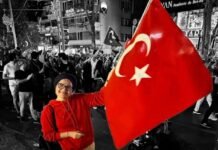
Mehmet Görmez, the controversial President of Turkish Religious Affairs (Diyanet), met with Iraqi cleric who has been named as a supporter of al-Qaeda and Taleban in a list of UN Security Council in Ankara on May 5.
According to official website of Iraqi Muslim Scholars Council, the Council’s Secretary General Muthanna Harith al-Dari, who is on the sanction list of UN Security Council since 2010, has been received by Turkish top imam Görmez in Ankara. The website has also listed the issues discussed during the meeting with Görmez.
Görmez, who expressed his respects to the cleric, told that he knew Al-Dari intimately and expressed appreciation for his work in Iraq. Görmez stated that Al-Dari’s prediction that the political process in Iraq would be unsuccessful. He also said that people who opposed to him and considered him as an extremist, are in fact accepting that he was right with his analysis and opinions.
Al-Dari is still in UN Security Council Sanctions Committee’s “Individual Targeted Sanctions List” with no QDI.278. Following accusations were listed for Al-Dari who was added to the list on March 25, 2010: Cooperating with Al-Qaeda, Osama Bin Laden, and Taliban, contributing to the financing of these groups and planning of Al-Qaeda Iraq activities, sending weapons and recruiting manpower to the groups.
Al-Dari, who lives in Jordan, is reported to have sent 1 million dollars in aid to al-Qaeda through various channels. Iraqi Muslim Scholars Council had called the ISIL’s invasion of Mosul as a “great victory by the revolutionaries.”
Al-Dari is also on the USA Department of Treasury wanted list and is also sanctioned by the UK government. In a statement released by the US Department of the Treasury on March 25, 2010, it is said that the department targeted the support network of al-Qaeda in Iraq (AQI) by designating Muthanna Harith al-Dari for providing financial, material, or technological support and financial or other services to or in support of AQI under Executive Order 13224. Executive Order 13224 freezes any assets the designated individuals have under US jurisdiction, and U.S. persons are prohibited from engaging in any transactions with those individuals.
The statement added that “Also, the UN 1267 Committee, which targets al-Qaeda and the Taleban, is adding al-Dari to the Consolidated List of individuals and entities associated with Usama bin Laden, al-Qaeda and the Taleban at the request of the Governments of Iraq and the United States.
“In addition to our designation, Treasury is pleased to have partnered with the Government of Iraq to list al-Dari at the UN’s 1267 Committee today, and we will continue our aggressive efforts to isolate those terrorist actors and networks that seek to threaten the stability of Iraq,” said Under Secretary for Terrorism and Financial Intelligence Stuart Levey.
“Based in Jordan and Iraq, Muthanna Harith al-Dari provides financial, material, or technological support and financial or other services to or in support of AQI including operational guidance for attacks against Iraqi Forces and Coalition Forces in Iraq. As of August 2008, al-Dari intended to reinvigorate the insurgency in Iraq by providing training to any insurgent organization fighting Coalition Forces. In one instance, al-Dari attended training meetings conducted by AQI in Syria in mid-August 2008, during which he explained AQI’s future intentions to the trainees and stated that all available support from AQI would be offered across Iraq for operations against Coalition Forces. Al-Dari also advised the trainees that he and two other individuals would soon be traveling to Baghdad to begin resupplying insurgent leaders with equipment.
“As of October 2008, al-Dari provided $1 million to an AQI member who actively recruits Iraqis in Syria and al-Anbar province to support AQI, instructing the recruiter to tell new AQI recruits that they would be paid up to $10,000 upon completion of their training in Syria. Additionally, as of 2008, al-Dari financed an AQI cell that called for fighting against the Iraqi Army and Multinational Forces – Iraq.
“In addition to the reasons for which he is being designated today, al-Dari provides money to his own Sunni insurgent group, the 1920s Revolutionary Brigade, and other insurgent cells. As of early July 2008, al-Dari provided money to a 1920s Revolutionary Brigade faction leader to fund the faction’s operations, to include targeting Coalition Forces, the Iraqi Army and Police, and Government of Iraq officials. Additionally, al-Dari provided funding to an improvised explosive device (IED) cell leader in order to conduct IED operations targeting Coalition Forces along a highway between Zaidan and Nassir Wa Salaam, Iraq.”
May 11, 2017














